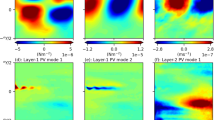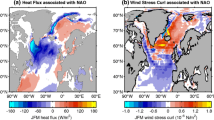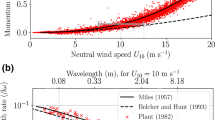Abstract
The influence of changes in surface wind-stress on the properties (amplitude and period) and domain of existence of thermohaline millennial oscillations is studied by means of a coupled model of intermediate complexity set up in an idealized spherical sector geometry of the Atlantic basin. Using the atmospheric CO2 concentration as the control parameter, bifurcation diagrams of the model are built to show that the influence of wind-stress changes on glacial abrupt variability is threefold. First, millennial-scale oscillations are significantly amplified through wind-feedback-induced changes in both northern sea ice export and oceanic heat transport. Changes in surface wind-stress more than double the amplitude of the strong warming events that punctuate glacial abrupt variability obtained under prescribed winds in the model. Second, the average duration of both stadials and interstadials is significantly lengthened and the temporal structure of observed variability is better captured under interactive winds. Third, the generation of millennial-scale oscillations is shown to occur for significantly colder climates when wind-stress feedback is enabled. This behaviour results from the strengthening of the negative temperature-advection feedback associated with stronger northward oceanic heat transport under interactive winds.










Similar content being viewed by others
References
Alley RB (2007) Wally was right: predictive ability of the North Atlantic “Conveyor Belt” hypothesis for abrupt climate change. Annu Rev Earth Planet Sci 35:241–272
Arzel O, Colin de Verdière A, England MH (2010) The role of oceanic heat transport and wind-stress forcing in abrupt millennial-scale climate transitions. J Clim 23:2233–2256
Arzel O, England MH, Colin de Verdière A, Huck T (2011) Abrupt millennial variability and interdecadal-interstadial oscillations in a global coupled model: sensitivity to the background climate state. Clim Dyn (Published online). doi:10.1007/s00382-011-1117-y
Arzel O, England MH, Sijp WP (2008) Reduced stability of the Atlantic Meridional Overturning Circulation due to wind-stress feedback during glacial times. J Clim 21:6260–6282
Bitz CM, Holland MM, Weaver AJ, Eby M (2001) Simulating the ice-thickness distribution in a coupled climate model. J Geophys Res 106:2441–2464
Braconnot P, Otto-Bliesner B, Harrison S, Joussaume S, Peterchmitt J-Y, Abe-Ouchi A, Crucifix M, Fichefet EDT, Hewitt CD, Kageyama M, Kitoh A, Laîné A, Loutre M-F, Marti O, Merkel U, Ramstein G, Valdes P, Weber SL, Yu Y, Zhao Y, (2007) Results of PMIP2 coupled simulations of the Mid-Holocene and Last Glacial Maximum. Part 1: experiments and large-scale features. Clim Past 3:261–277
Brook EJ, Sowers T, Orchardo J (1996) Rapid variations in atmospheric methane concentration during the past 110,000 years. Science 273:1087–1091
Clark PU, Pisias NG, Stocker TF, Weaver AJ (2002) The role of the thermohaline circulation in abrupt climate change. Nature 415:863–869
Colin de Verdière A, te Raa L (2010) Weak oceanic heat transport as a cause of the instability of glacial climates. Clim Dyn 35:1237–1256
Dijkstra HA, Ghil M (2005) Low-frequency variability of the large scale ocean circulation: a dynamical system approach. Rev Geophys 43:1–38
Gent PR, McWilliams JC (1990) Isopycnal mixing in ocean circulation models. J Phys Oceanogr 20:150–155
Gildor H, Tziperman E (2003) Sea-ice switches and abrupt climate change. Phil Trans R Soc A 361:1935–1944
Green JSA (1970) Transfer properties of the large-scale eddies and the general circulation of the atmosphere. Q J R Meteorol Soc 96:157–185
Hellerman S, Rosenstein M (1983) Normal monthly wind stress over the World Ocean with error estimates. J Phys Oceanogr 13:1093–1104
Kageyama M, Paul A, Roche DM, Meerbeeck CJV (2010) Modelling glacial climatic millennial-scale variability related to changes in the Atlantic meridional overturning circulation: a review. Quat Sci Rev 29:2931–2956
Lang C, Leuenberger M, Schwander J (1999) 16 degree C rapid temperature variation in central Greenland 70 kyr ago. Science 286:934–937
Li C, Battisti DS (2008) Reduced Atlantic storminess during Last Glacial Maximum: evidence from a coupled climate model. J Clim 21:3561–3579
Li C, Battisti DS, Bitz CM (2010) Can North Atlantic sea ice anomalies account for Dansgaard-Oeschger climate signals? J Clim 23:5457–5475
Lopez-Martinez C, Grimalt JO, Hoogakker B, Gruetzner J, Vautravers MJ, McCave IN (2006) Abrupt wind regimes changes in the North Atlantic ocean during the past 30,000–60,000 years. Paleoceanography 41. doi:10.1029/2006PA001275
Loulergue L, Schilt A, Spahni R, Masson-Delmotte V, Blunier T, Lemieux B, Barnola J-M, Raynaud D, Stocker TF, Chappellaz J (2008) Orbital and millennial-scale features of atmospheric CH4 over the past 800,000 years. Nature 453:383–386
Loving JL, Vallis GK (2005) Mechanisms for climate variability during glacial and interglacial periods. Paleoceanography 20. doi:10.1029/2004PA001113
Masson-Delmotte V, Jouzel J, Landais A, Stievenard M, Johnsen SJ, J. White WC, Werner M, Sveinbjornsdottir A, Fuhrer K (2005) GRIP deuterium excess reveals rapid and orbital-scale changes in Greenland moisture origin. Science 309:118–121
Monahan AH, Alexander J, Weaver A (2008) Stochastic models of the meridional overturning circulation: time scales and patterns of variability. Phil Trans R Soc A 366:2527–2544
NGRIP (2004) High-resolution record of northern hemisphere climate extending into the last glacial period. Nature 431:147–151
Pacanowski R (1996) MOM 2 documentation user’s guide and reference manual. Version 2.0. Geophysical Fluid Dynamics Laboratory Ocean Technical Report. NOAA, GFDL, p 232
Pausata FSR, Li C, Wettstein JJ, Kageyama M, Nisancioglu KH (2011) The key role of topography in altering North Atlantic atmospheric circulation during the last glacial period. Clim Past 7:1089–1101
Schulz M (2002) The tempo of climate change during Dansgaard-Oeschger interstadials and its potential to affect the manifestation of the 1470-year climate cycle. Geophys Res Lett 29. doi:10.1029/2001GL013277
Severinghaus JP, Brook EJ (1999) Abrupt climate change at the end of the last glacial period inferred from trapped air in polar ice. Science 286:930–934
Stone PH, Yao MS (1990) Development of two-dimensional zonally averaged statistical-dynamical model. Part III: The parametrization of the eddy fluxes of heat and moisture. J Clim 3:726–740
Stouffer RJ, Dixon KW, Spelman MJ, Hurlin W, Yin J, Gregory JM, Weaver AJ, Eby M, Flato GM, Robitaille DY, Hasumi H, Oka A, Hu A, Jungclaus JH, Kamenkovich IV, Levermann A, Nawrath S, Montoya M, Murakami S, Peltier WR, Vettoretti G, Sokolov A, Weber SL (2006) Investigating the causes of the response of the thermohaline circulation to past and future climate changes. J Clim 19:1365–1387
Timmermann A, Gildor H, Schultz M, Tziperman E (2003) Coherent resonant millennial-scale climate oscillations triggered by massive meltwater pulses. J Clim 16:2569–2585
Timmermann A, Krebs U, Justino F, Goosse H, Ivanochko T (2005) Mechanisms for millennial-scale global synchronisation during the last glacial period. Paleoceanography 20. doi:10.1029/2004PA001090
Timmermann A, Okumura Y, An S-I, Clement A, Dong B, Guilyardi E, Hu A, Jungclaus JH, Renold M, Stocker TF, Stouffer RJ, Sutton R, Xie S-P, Yin J (2007) The influence of a weakening of the Atlantic Meridional Overturning Circulation on ENSO. J Clim 20:4899–4919
Weaver AJ, Eby M, Wiebe EC, Bitz CM, Duffy PB, Ewen TL, Fanning AF, Holland MM, MacFadyen A, Matthews HD, Meissner KJ, Saenko O, Schmittner A, Wang H, Yoshimori M (2001) The UVic earth system climate model: model description, climatology, and applications to past, present and future climates. Atmos Ocean 34:1067–1109
Winton M (1997) The effect of cold climate upon North Atlantic Deep Water formation in a simple ocean-atmosphere model. J Clim 10:37–51
Wolff EW, Chappellaz J, Blunier T, Rasmussen SO, Svensson A (2010) Millennial-scale variability during the last glacial: the ice core record. Quat Sci Rev 29:2828–2838
Wunsch C (2006) Abrupt climate change: an alternative view. Quat Res 65:191–203
Acknowledgments
We wish to thank Alain Colin de Verdière and Valérie Masson-Delmotte for comments on a first draft of this manuscript. The authors are grateful to the University of Victoria for supplying us the model. All computations were done on the Linux cluster Tensor at the University of New South Wales in Sydney, Australia. Use of these computing facilities is gratefully acknowledged. This study was supported in part by the Australian Research Council.
Author information
Authors and Affiliations
Corresponding author
Rights and permissions
About this article
Cite this article
Arzel, O., England, M.H. Wind-stress feedback amplification of abrupt millennial-scale climate changes. Clim Dyn 40, 983–995 (2013). https://doi.org/10.1007/s00382-012-1288-1
Received:
Accepted:
Published:
Issue Date:
DOI: https://doi.org/10.1007/s00382-012-1288-1




